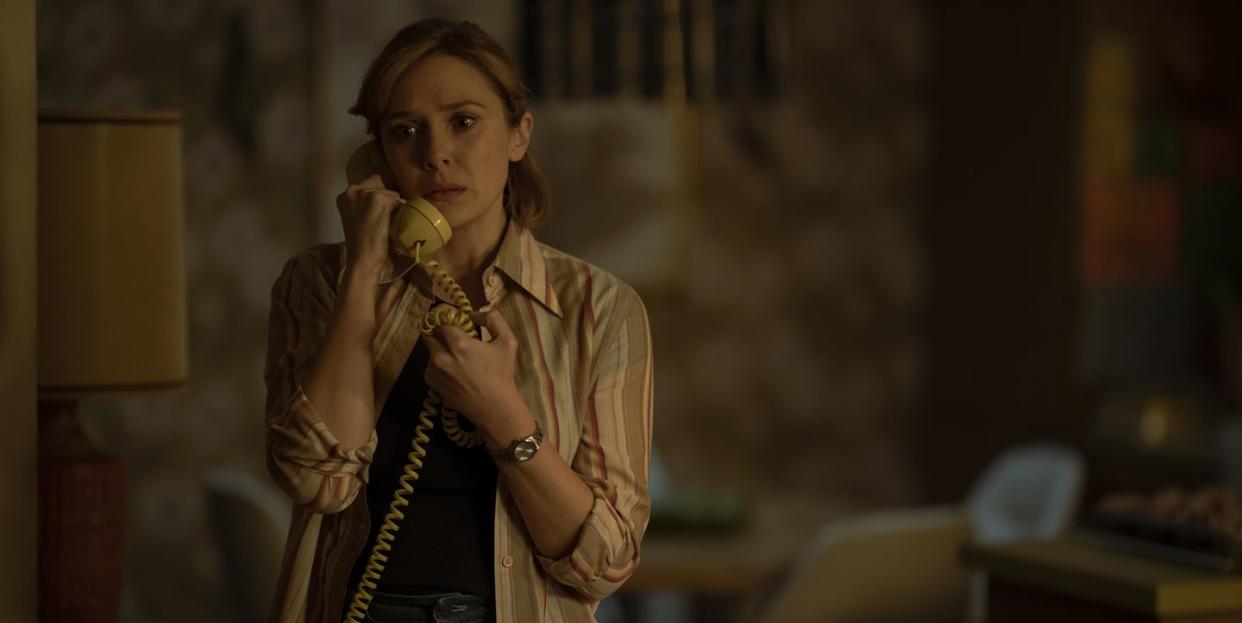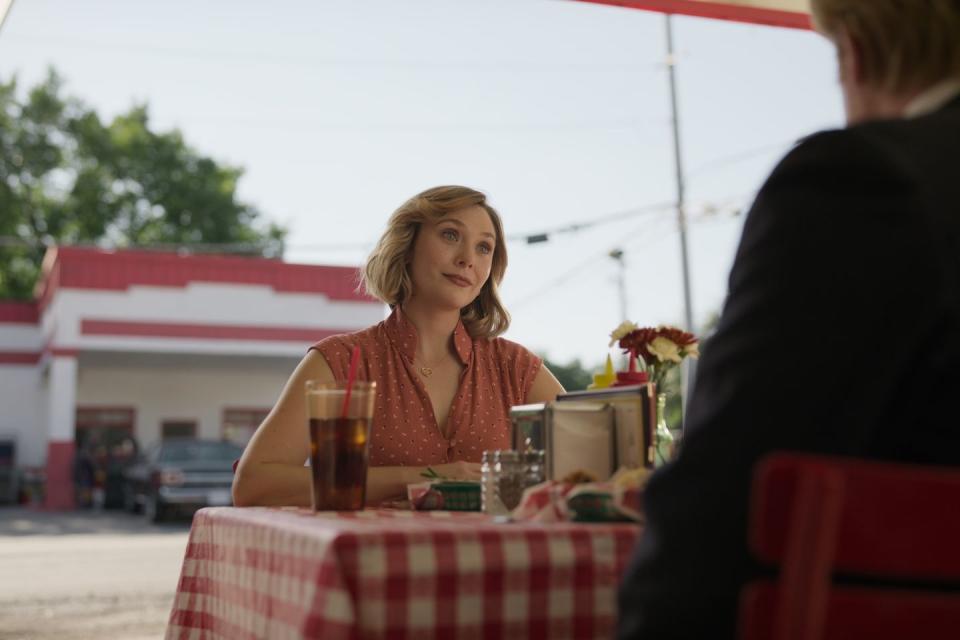Haven't We Seen This Murder Before?

- Oops!Something went wrong.Please try again later.
"Hearst Magazines and Yahoo may earn commission or revenue on some items through these links."
In our supreme age of intellectual property, true crime is as much a Hollywood brand as Marvel, Star Wars, and those mischievous Minions. Audiences can't get enough of the genre, which has been commodified to the point of addiction, so TV networks, streaming services, and podcast studios keep greenlighting the deadliest sagas they can find. There's no clearer example of the true-crime gold rush than Love & Death and Candy, two shows premiering less than a year apart and depicting the same decades-old homicide.
The creatives behind the series say their dual existence is pure coincidence. Both recount the sordid tale of Candy Montgomery, a well-liked Texas housewife who had an affair with the husband of Betty Gore, a friend from her tight-knit Methodist church. On an otherwise normal summer day in 1980, Montgomery struck Gore with an axe 41 times at Gore's home. Montgomery claimed self-defense, and a jury found her not guilty of murder. Naturally, the incident became national gossip.
In 1984, the juicy nonfiction book Evidence of Love: A True Story of Passion and Death detailed what happened, at least from the point of view of Montgomery and others still alive to talk about it. Evidence of Love was then adapted into a basic-cable movie—a key medium for sensationalistic crime content before "prestige TV" was formalized—that earned Barbara Hershey an Emmy. More than two decades later, Hulu released Candy, with Jessica Biel and Melanie Lynskey in the lead roles. Eleven months after that, HBO Max is debuting Love & Death, starring Elizabeth Olsen and Lily Rabe, on April 27. Its source material is Evidence of Love.

"To me, what's intriguing is why this happened, not how it happened," Lesli Linka Glatter, who produced Love & Death with writer David E. Kelley and directed all seven episodes, tells Town & Country. "It's an American tragedy, and a deeply psychological story. You have to look deeper to see what's really going on underneath the surface."
At its best, true crime does just that. It's nuanced and somewhat intellectual, digesting the gradations of antiheroes' wrongdoing, as seen in Escape at Dannemora and The Assassination of Gianni Versace: American Crime Story. At its most objectionable, the genre focuses on recreating grisly titillation (Dahmer — Monster: The Jeffrey Dahmer Story) or projecting dubious clarity onto damaged protagonists (The Girl from Plainville). The shows that get made across the spectrum tend to center good-looking white people, some of whom become provocative Halloween costumes.
Ultimately, true crime necessitates an audience sophisticated enough to know that the "true" part doesn't always live up to its name, largely because no one is privy to what goes on behind closed doors or in the recesses of someone's mind. (Evidence of Love contains assertions that are unverifiable, including private conversations, some of which are repeated word-for-word in Love & Death.) A few series have wisely leaned into this impenetrability, like HBO Max's The Staircase, which dramatizes the death of crime novelist Michael Peterson's wife using multiple conflicting perspectives.

Much of true crime's ubiquity can be explained in simple business terms. Sometime in the mid-2010s, as the streaming boom crystallized, TV executives realized that transgressions—true and otherwise (see: True Detective, Ozark)—were a surefire way to keep customers engaged. A few hits begat many, many more. Jordan Helman, head of scripted content at Hulu, says the service okayed Candy on the heels of another true-crime smash that shared a co-creator in Nick Antosca. "The greenlighting of that show was largely inspired by the robust performance of The Act," Helman says, referring to 2019's Munchausen-by-proxy drama featuring Patricia Arquette and Joey King, "which at the time of its launch drove more new subscribers to the platform than any other Hulu original in its first month."
But Hollywood trends tend to wax and wane. Entire genres and distribution models can become passé. So at what point, if ever, do audiences burn out on murder shows? Or are viewers simply hardwired to enjoy witnessing the turmoil that we, like Candy Montgomery before she hacked up Betty Gore, believe ourselves incapable of perpetrating?
Cristel Antonia Russell, a Pepperdine University professor who studies entertainment consumption, isn't sure the public will ever tire of true crime. She cites two reasons. First, an intergenerational factor: Like soap operas, whose familiar narrative patterns she has researched, crime fiction has an age-agnostic appeal. Second, there's a twisted universality baked in. "If you look at the very oldest drama, Greek and Roman theater, it was also about crime," she says. "You're not attracted to these characters and what happens to them because you identify with them but because they represent some kind of evil, dark side that maybe allows you to purge those dark things. And because it's television, I think there is something about the genre that is less subject to traditional Hollywood cycles."

At this point, audiences are trained to see true crime as event programming. Despite accusations of exploitation, Dahmer quickly became one of the most-watched shows in Netflix's history; only Squid Game, Stranger Things, and Wednesday outpace it as of now. Part of what make Love & Death and Candy so watchable are the unlikely avatars at their center: small-town mothers who seem like they could barely lift an axe, much less swing one at a fellow churchgoer's head. One Love & Death character calls Candy "the most normal person on the planet," which could also describe the protagonists in USA Network's Dirty John, Hulu's Welcome to Chippendales, NBC's The Truth About Pam, and HBO's Landscapers.
Netflix's execs declined to comment for this story, but Helman says Hulu remains committed to the genre. "These ripped-from-the-headlines pieces have been instrumental in our brand evolution and are a meaningful part of our core identity," he says. "They may not be essential to every service but have certainly made a substantial impact on Hulu’s original programming."
Much in the way that Netflix parodied crime-documentary tropes with American Vandal, Peacock—home to Dr. Death and the Jake Lacy vehicle A Friend of the Family—will soon satirize TV's scripted-crime obsession in Based on a True Story, a comedic thriller starring Kaley Cuoco and Chris Messina. The craze has already reached the point of caricature, so the next question is whether networks can find ways to revamp true-crime clichés.
"Now that the crimes are so outrageous and so vivid, it's a voyeurism drive, where you're like, 'Oh, my goodness, I can't believe what I'm seeing,'" Russell says. "Once you get addicted to something, you need a bigger dose to satisfy your desire for the high that you get from it."
You Might Also Like

